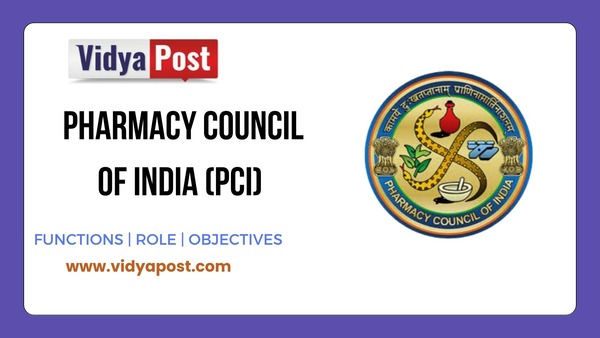Know All about Pharmacy Council of India (PCI)- Functions Role Objectives

The Pharmacy Council of India (PCI) is a statutory body of the Government of India's Ministry of Health and Family Welfare. It was founded in 1948 under the Pharmacy Act. The Act was passed by Parliament to improve the regulation of the pharmacy profession and practice throughout the country.
Every five years, the central government establishes the Pharmacy Council of India. PCI is formed by three types of members who work together to form a framework:
-
Elected members
-
Nominated members
-
Ex-officio members
HISTORY
When India gained independence in 1947, it inherited from the British rulers an unorganized system for the pharmacy profession, with no legal restrictions on the practice of pharmacy. The concept of pharmacy practice did not emerge until after independence. To control pharmacy practice, education, and profession, the Pharmacy Act 5 was passed in 1948 as the first minimum educational requirement for pharmacy practice in the country.
The Pharmacy Act of 1948 was passed on April 3, 1948, with the preamble: "An Act to control the pharmacy industry. While it is necessary to have Pharmacy Councils to better regulate the pharmacy profession and practice, better regulations should be put in place "On 9.8.49, the PCI was established in compliance with the Pharmaceutical Act's Section 3
According to the Act, each state must create a state pharmacy council that is in charge of supervising and registering pharmacists in that state. Source
Also, Read All about BCI- Bar Council of India
ROLE OF PCI
-
To control pharmacy education in the country.
-
To allow chemist registration under the Pharmacy Act.
-
To govern the pharmacy profession and practice.
FUNCTIONS OF PCI
-
To prescribe the minimal level of education necessary to become a chemist, i.e. to create Education Regulations outlining the conditions that institutions seeking PCI approval for pharmacy education must meet.
-
To ensure that educational standards are implemented consistently across the country.
-
To authorise the academic training institutes that offer pharmacy courses, as well as the courses of study and exams for pharmacists.
-
To revoke approval if an approved course of study or an approved examination does not continue to meet the PCI's educational standards.
-
To approve qualifications granted outside of the territories covered by the Pharmacy Act, i.e. foreign qualifications.
-
To keep a central list of pharmacists. Source
THE MISSION
To improve the health of all members of society by promoting safe, effective, and rational medicine use, patient counseling, and disease management monitoring (via pharmaceutical care).
The mission is fundamental and serves as the cornerstone for promoting the highest moral and professional standards in pharmacy, emphasizing the role of pharmacists as skilled healthcare providers, educating the public about vital professional issues, and supporting pharmaceutical education and sciences in all spheres.
-
The pharmacists will work with other experts as the preferred source of information and guidance on disease management through prescription and medication.
-
To provide cutting-edge, custom-made medications in the primary care context, pharmacists will expand their pharmacological knowledge and resources.
-
Pharmacists will gain knowledge to participate in medication management and outcome monitoring, including the ability to change doses and change medications within established therapeutic protocols.
-
Pharmacists will actively participate in national health programs, such as the promotion of essential drugs, primary health care, HIV/AIDS, TB, Malaria, Tobacco use, and family planning.
CONCLUSION
The Pharmacy Council of India (PCI), a statutory body governed by the Pharmacy Act, of 1948, established by the Parliament, regulates pharmacy education and practice in India up to the graduate level. On 9.8.49, the PCI was established by section 3 of the Pharmacy Act. The Pharmacy Act gave the pharmacy profession in India a framework. It improved the stature of the pharmacy profession in the nation and regulated it. It regulated and elevated the pharmacy profession in the country. Individuals wishing to enter this profession were given standardized and uniform education. It aided the government in gaining some control over the professionals working in this field.
Also, Read All about DCI-Dental Council of India
Share:

2 Comments
Jordan Singer
2d2 replies
Santiago Roberts
4d